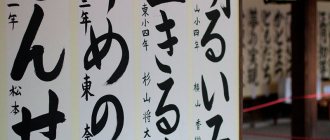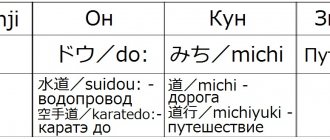| Origin: | Japanese names |
| Category: | Female names |
| Meaning: | bow, useful beauty |
| Name number: | 2 |
| Zodiac sign: | ♑ Capricorn, ♊ Gemini, ♋ Cancer, ♐ Sagittarius |
The main feature of the name is sociability and the ability to establish relationships and negotiate. People with this name are real peacemakers and excellent psychologists who help others and themselves build good relationships. You have a sense of humor, the ability to communicate, and build relationships, which will help you achieve your goals in any activity. However, sometimes it is better for you to come down to earth and not try to please everyone, so as not to get into trouble. A little strength of character certainly won't hurt you.
Interpretation of the meanings of each of the letters of the name Yumi
Yu - Owners of this letter are dreamy, amorous and extremely romantic, prone to worry and emotionality. They are impulsive and hot-tempered, they can go down both good and bad paths. At the same time, they may be seriously afraid of marriage, but at the same time they remain faithful to their spouses and do not deceive them.
M – Humanity, a rare ability to put up with other people’s shortcomings, curiosity and openness to everything new at any age. Caring, but not intrusive. Adorable.
I - This letter in the name shows sincerity, subtlety of the soul and aesthetic taste, a subtle sense of harmony, natural grace. This is manifested not only in caring for the beauty of one’s appearance and environment, but also in the way of thinking. Hence - irony, honesty, straightforwardness, which does not delight partners. The result: either frequent marriages, or numerous acquaintances and romantic relationships that do not oblige both parties to anything.
Name Yumi in English (Latin)
IUmi
When filling out a document in English, you should first write your first name, then your patronymic in Latin letters, and then your last name. You may need to write the name Yumi in English when applying for a foreign passport, ordering a foreign hotel, when placing an order in an English online store, and so on.
Useful video
Here is an interpretation of the female name Yumi, what is best suited, and what people who wear it should be wary of. You often hear the sounds of your name; they have influenced you since childhood. Understanding what will attract good luck to you, knowing the best sides of your character, you will achieve a lot.
- Writing in Latin transliteration – Yumi
- The element named after Yumi is Water.
- Best suited colors – Brown-gray, Pink
- Attractive success of the name Yumi, metal – Titan
- Lucky for this name, the tree is Balsa
- Corresponding planet – Saturn
- Constellation of joy and well-being - Phoenix
- According to the numerology of the name Yumi
, the numbers that bring good luck are Two - You better eat food - dairy products and meat
- Animal amulets for the name Yumi
- tiger - Stones - talismans for women with the name Yumi - Azurite
Meaning of a girl named Yumi
To attract financial success and happiness, girls named Yumi need a strong Money Amulet
, the main thing is that it is encoded for you personally, for your full name and your date of birth. I can only recommend this trusted site! The Luck Talisman really works to create an aura of well-being, it is important to wear it constantly and not tell anyone about its purpose. Activate it on yourself or the person you are buying it for, according to the instructions.
Japanese male and female names
Japanese names usually have two parts - the surname, which comes first, and the given name, which comes second. The Japanese often write their names in "European order" (first name - last name) if they write them in romaji. The Japanese sometimes write their last name in capital letters to avoid confusion with their given name.
In ancient times, only aristocrats (kuge) and samurai (bushi) had Japanese surnames. The rest of the Japanese population was content with personal names and nicknames.
Women of aristocratic and samurai families also usually did not have surnames, since they did not have the right of inheritance. In those cases where women did have surnames, they did not change them upon marriage.
Surnames were divided into two groups - the surnames of aristocrats and the surnames of samurai.
Unlike the number of samurai surnames, the number of aristocratic surnames has practically not increased since ancient times. Many of them went back to the priestly past of the Japanese aristocracy. Personal names of samurai servants and peasants were often given according to the principle of "numbering". The first son is Ichiro, the second is Jiro, the third is Saburo, the fourth is Shiro, the fifth is Goro, etc. Also, in addition to “-ro”, the suffixes “-emon”, “-ji”, “-zo”, “-suke”, “-be” were used for this purpose.
Upon entering the period of adolescence, the samurai chose a different name for himself than the one given to him at birth. Sometimes samurai changed their names throughout adult life, for example, to emphasize the onset of a new period (promotion or moving to another duty station). The master had the right to rename his vassal. In cases of serious illness, the name was sometimes changed to that of Amida Buddha to appeal to his mercy.
According to the rules of samurai duels, before the fight, the samurai had to say his full name so that the enemy could decide whether he was worthy of such an opponent. Of course, in life this rule was observed much less often than in novels and chronicles.
- The suffix “-hime” was added to the end of the names of girls from noble families. It is often translated as "princess", but in fact it was used to refer to all noble ladies.
The suffix “-gozen” was used for the names of samurai wives. They were often called simply by their husband's surname and rank. Personal names of married women were practically used only by their close relatives.
- For the names of monks and nuns from the noble classes, the suffix “-in” was used.
The most common Japanese surnames now are Suzuki, Tanaka, Yamamoto, Watanabe, Saito, Sato, Sasaki, Kudo, Takahashi, Kobayashi, Kato, Ito, Murakami, Oonishi, Yamaguchi, Nakamura, Kuroki, Higa.
Most Japanese girl names end in "-ko" ("child") or "-mi" ("beauty"). Girls, as a rule, are given names associated in meaning with everything beautiful, pleasant and feminine. Unlike male names, female names are usually written in hiragana rather than kanji.
Some modern girls do not like the ending “-ko” in their names and prefer to omit it. For example, a girl named "Yuriko" might call herself "Yuri".
After death, a Japanese person receives a new, posthumous name (kaime), which is written on a special wooden tablet (ihai). This tablet is considered to be the embodiment of the spirit of the deceased and is used in funeral rites. Kaime and ihai are purchased from Buddhist monks - sometimes even before the person's death.
- Aki
- Akio
- Akira
- Arata
- Akemi
- Aki
- Akiko
- Amaya
- Arisu
- Goro
- Gina
- Daichi
- Giro
- Juro
- Junko
- Isamu
- Ichiro
- Izumi
- Kazuki
- Kazuo
- Katashi
- Katsu
- Katsuo
- Katsuro
- Ken
- Kenji
- Kenichi
- Kenta
- Kenshin
- Kichiro
- Kiyoshi
- Kuro
- Katana
- Kazuko
- Keiko
- Kiku
- Kimiko
- Kin
- Kiyoko
- Kohaku
- Kumiko
- Masuyo
- Minoru
- Mariko
- Midori
- Miki
- Minako
- Mitsuko
- Michi
- Michiko
- Miyako
- Moriko
- Nanashi
- Nibori
- Nobu
- Nori
- Nana
- Nanashi
- Naoko
- Naomi
- Natsuko
- Natsumi
- Osamu
- Riyo
- Riyota
- Rokuro
- Ran
- Ren
- Ray
- Saburo
- Susumu
- Saki
- Sakura
- Sango
- Sachiko
- Sayuri
- Sora
- Suzu
- Suzume
- Sumiko
- Takashi
- Takeshi
- Takumi
- Tarot
- Takako
- Takehiko
- Tamiko
- Tomiko
- Ume
- Usagi
- Hachiro
- Hideaki
- Hikaru
- Hiroshi
- Hotaka
- Haruko
- Hikari
- Hiroko
- Hitomi
- Hoshi
- Hotaru
- Chica
- Chikako
- Shiro
- Shichiro
- Shinju
- Yori
- Yoshi
- Yoshiro
- Yoko
- Yoshi
- Yoshiko
- Amy
- Yuki
- Yukiko
- Yuko
- Yumi
- Yuri
- Yasu
- Aiko
- Akako
- Akane
- Akemi
- Akeno
- Aki
- Akiko
- Akina
- Akio
- Akira
- Akiyama
- Amaya
- Ami
- Amida
- Anda
- Aneko
- Anzu
- Arata
- Arisu
- Asuka
- Ayame
- Azarni
- Benjiro
- Botan
- Chika
- Chikako
- Chinatsu
- Chiyo
- Chizu
- Cho
- Dai
- Daichi
- Daiki
- Daisuke
- Etsu
- Etsuko
- Fudo
- Fujita
- Gin
- Goro
- Hana
- Hanako
- Haru
- Haruka
- Haruko
- Hachiro
- Hideaki
- Hikaru
- Hide
- Hiroko
- Hiroshi
- Hitomi
- Hoshi
- Hotaka
- Hotaru
- Ichiro
- Ima
- Isami
- Ishi
- Izanami
- Izumi
- Jiro
- Joben
- Jomei
- Junko
- Juro
- Kado
- Kaede
- Kagami
- Kameko
- Kanaye
- Kano
- Kasumi
- Katashi
- Katsu
- Katsuo
- Katsuro
- Kazuki
- Kazuko
- Kazuo
- Kei
- Keiko
- Keitaro
- Ken
- Ken'ichi
- Kenji
- Kenshin
- Kenta
- Kichi
- Kichiro
- Kiku
- Kimiko
- Kin
- Kyoko
- Kisho
- Kita
- Kiyoko
- Kiyoshi
- Kohaku
- Kohana
- Koko
- Koto
- Kotone
- Kumiko
- Kuri
- Kuro
- Kyo
- Kyoko
- Leiko
- Machi
- Machiko
- Maeko
- Maemi
- Mai
- Makoto
- Mamiko
- Mamoru
- Manami
- Mariko
- Marise
- Masa
- Masakazu
- Mashiro
- Matsu
- Mayako
- Mayoko
- Mayuko
- Michi
- Michie
- Michiko
- Michio
- Midori
- Mihoko
- Mika
- Miki
- Mikio
- Mina
- Minako
- Mine
- Minoru
- Misaki
- Mitsuko
- Miya
- Miyako
- Mizuki
- Momoko
- Montaro
- Moriko
- Morio
- Mura
- Mutsuko
- Nahoko
- Nami
- Namiko
- Nana
- Naoko
- Naomi
- Nara
- Nariko
- Natsuko
- Natsumi
- Nayoko
- Nibori
- Nikki
- Nikko
- Nori
- Noriko
- Nozomi
- Nyoko
- Oki
- Orino
- Osamu
- Rafu
- Rai
- Raidon
- Ran
- Rei
- Reiko
- Ren
- Renjiro
- Renzo
- Riko
- Rin
- Rinji
- Rini
- Risako
- Ritsuko
- Roka
- Rokuro
- Ronin
- Rumiko
- Ruri
- Ryo
- Ryoichi
- Ryoko
- Ryota
- Ryozo
- Ryuichi
- Ryuu
- Saburo
- Sachi
- Sachiko
- Sachio
- Saeko
- Saki
- Sakiko
- Sakuko
- Sakura
- Sanako
- Sango
- Saniiro
- Satu
- Sayuri
- Seiichi
- Sen
- Shichiro
- Shika
- Shima
- Shina
- Shinichi
- Shiro
- Shizuka
- Sho
- Sora
- Sorano
- Suki
- Suma
- Sumi
- Susumi
- Suzu
- Suzume
- Tadao
- Taka
- Takako
- Takara
- Takashi
- Takehiko
- Takeo
- Takeshi
- Takumi
- Tama
- Tamiko
- Tani
- Tarot
- Taura
- Teijo
- Tomeo
- Tomiko
- Tora
- Torio
- Toru
- Toshi
- Toshiro
- Toya
- Tsukiko
- Tsuyu
- Udo
- Ume
- Umeko
- Usagi
- Uyeda
- Yachi
- Yasu
- Yasuo
- Yayoi
- Yogi
- Yoko
- Yori
- Yoshi
- Yoshiko
- Yoshiro
- Yuki
- Yukiko
- Yukio
- Yuko
- Yumako
- Yumi
- Yumiko
- Yuri
- Yuriko
- Yuu
- Yuudai
- Nagisa
- Kaworu
- Ritsuko
- Akagi
- Shinji
- Misato
- Katsuragi
- Asuka
- Soryu
- Ayanami
- Rei
- Kenshin
- Akito
- Kuramori Reika
- Rurouni
- Himura
- Shishio Makoto
- Takani Megumi
- Shinomori Aoshi
- Makimachi Misao
- Saito Hajime
- Hiko Seijuro
- Seta Sojiro
- Mirai
- Hajime
- Mamoru
- Jibo
- Hikari
- Atarashiki
- Namida
- Sora
- Ginga
- Eve
- Izya
- Usagi
- Tsukino
- Ray
- Hino
- Ami
- Mitsuno
- Corey
- Makoto
- Movie
- Minako
- Aino
- Setsuna
- Mayo
- Haruka
- Teno
- Michiru
- Kayo
- Hotaru
- Tomo
- Kaori
- Yumi
- Hakufu
Return to section: Japanese male and female names
« Meaning of the name »
Information
▲
() Random practice: Online training - Dynamic affirmations Currently online on the site:
43 people. | Public offer | Your Yoga on social networks
See also:
Will they pay me back?
Gypsy cards provide answers to many questions, including whether they will give you the money they took from...
Tarot for tomorrow
Every day can present various surprises, including unpleasant ones. It's not for nothing that we worry about...
Debt repayment
Gypsy fortune telling helps to get answers to many questions, including those related to debt repayment. Tsy...
"Egyptian Oracle of the Pyramids"...
In some situations, it is not easy for a person to assess his strengths, thoughts and feelings, how much he can influence...
To work for the near future...
Activity occupies an important place in the life of every person, sometimes he is afraid of simply being left without work or...
Tarot: Will I find my love?...
There are many different types of Tarot readings, including in matters of love. For those who dream of a romantic h...
Tarot for today
Every day is fraught with various surprises, problems and troubles. In some cases it is possible to foresee...
Nicknames for girls puppies
A name of Japanese origin for a girl puppy can be easily found using the list below:
- Azemi - a flower with thorns,
- Ay - beloved,
- Akemi is a beauty
- Aki - similar to golden autumn,
- Akira - morning light
- Akane - irresistible beauty
- Amaya - rain before bedtime,
- Aoi - boundless blue,
- Arizu - noble
- Asemi - beauty of the morning,
- Aya - like silk,
- Ayaka is a bright flower,
- Ayam - rainbow stripe,
- Banquo is a character from a fairy tale,
- Janko is an eternal child,
- June is obedient
- Zhina is silver,
- Izumi - gushing energy
- Yoko - child of the sea,
- Yoshi - pleasant smell
- Yoshiko - noble scent,
- Yoshshi - good
- Kam is a turtle,
- Keiko - happy and respectful,
- Kay - respectful
- Kiku - chrysanthemum,
- Kimiko - empowered
- Kin - golden
- Kotoun - great sounding,
- Koheku - amber,
- Kaed - maple leaf,
- Kezu - harmony,
- Kazuko is a harmonious child,
- Marie - beloved
- Midori - green
- Mizuki - belonging to the moon,
- Mika is the first sound
- Miki is a beautiful tree,
- Miko - beautiful and blessed,
- Minori is a place where beauty lives,
- Miho is a beautiful water surface,
- Michi - walking path,
- Miyuki is happy
- Momo - blessed a hundred times,
- Moriko - forest child
- May - dancing
- Maine is true
- Menami - love beauty,
- Nana - seven,
- Naomi is a beauty
- Nori is principled,
- Neo - honest
- Ran - water flower,
- Ray is polite
- Rika - smelling delicious
- Sora - heavenly
- Suzu - ringing,
- Sengo - coral
- Toshi - restless
- Tekera is a treasure,
- Umeko - child of the plum tree
- Fumiko is forever beautiful
- Hana is the favorite
- Hiro is famous
- Hitomi - beautiful eyes,
- Hoteru - firefly
- Hoshi - star
- Chi - wisdom
- Chiesa - beautiful morning,
- Cho is a butterfly
- Shayori - guide,
- Shika is a gentle deer,
- Shinju - pearl,
- Eika - love melody
- Eyumi - who loves to walk,
- Amy - smile
- Yuka is nice
- Yuki is a snowflake
- Yuko - useful,
- Yumi - respectful
- Yuri - lily
- Yasu is calm.











